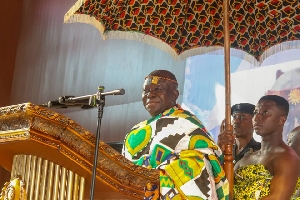- Home - News
- TWI News | TV
- Polls
- Year In Review
- News Archive
- Crime & Punishment
- Politics
- Regional
- Editorial
- Health
- Ghanaians Abroad
- Tabloid
- Africa
- Religion
- Election 2020
- Coronavirus
- News Videos | TV
- Photo Archives
- News Headlines
- Press Release
Opinions of Thursday, 26 December 2013
Columnist: Ali, Chibaro
Are Our Leaders Fighting The Causes Or The Symptoms Of Our Economic Crises?
It is interesting these days to wake up and all you hear on our media
airwaves is either embezzlement of public funds, corruption, mismanagement
of public funds, sales and auction of government properties, causing
financial loss to the state, judgement debts and setting up of committees
among others. When will this old vicious cycle thing stop? I have tried as
much as I can to go parellel with my thoughts of some of these issues (for
fear of being tagged as a politician) parading their dirty wings in our
political jungle but in as much as I try, my conscience attacks me for
being mute and voiceless. Just as we all have the constitutional right to
exercise our franchise to elect political leaders, we equally have the
right to comment on any issue of national interest and criticise
constructively when the need arise. I have said it time without number that
it's time the youth of this country rise up and hold the bull by the horn
against the corrupt leaders in this country without fear or favour. The
youths must always remember that the future of this country belong to them
and for how long shall we hide our emotions under the darkness of politics
whiles our politicians trample upon our faiths in the rhythm of politics. I
am tempted at times to consort with those calling for a military rule, for
it seems to be the ONLY tool that can truncate if not expunging the
perennial corruption bedeviling our country Ghana. We ought to take a firm
stance and mince no words or sentence in telling our unscrupulous leaders
to put the tax payers' monies into developing the country rather than their
selfish interest and personal gains.
My good friends, its clear from all indications that our leaders are not
poised to fighting corruption in this country and it is you and I who
suffer at the end of the day as tax payers. Instead of tackling the causes
of the economic woes and removing the causative agent, they jump to battle
with the effects and in no time the problems resurface. Corruption is
looming in almost every public office in this country and it's a
spine-chilling phenomenon. It is one of the major setbacks hindering the
development of Ghana since independence. People dip their long hands into
government coffers for their personal interest and when they are caught in
day light, the best the government of 'Nkrumah Ghana' can do is only to set
up commitees and that ends it, period! The culprits are left to gloat about
and saunter with shoulder high leaving the poor farmers and the tax payers
in the villages in abject poverty; no portable water, no goods roads, no
health care centers and the rest. At the expense of these, we are faced
with the pathetic irony of the villagers lining up to hail these nabobs in
the country who only come to give lip service development. Are we not
dwindling the spirit of our indefatigable journalists who risk their lives
to investigate some of these unwholesome practices in the system? Manessah
Azure Awuni's (a journalist at Joy fm) case about GYEEDA and others are
worth mentioning here.
What happened? Ghana and Malaysia are both former British colonies that
gained independence the same year with similar economic conditions and
Ghana was even rated as a potential fast growing economy because of its
huge natural resources, but today the story is the reverse. Today Malaysia
makes its own cars and boasts skyscrapers that rival anything in New York
or London (BBC). It imported its first palm oil from Ghana and managed to
improve its cultivation process thus turning the country into one of the
largest palm oil producer in the world and developing chemicals such as bio
diesel for industries and food addictives from the raw nuts. One may say
Ghana was plagued by coups shortly after independence, but what were the
causes?
Ghana on the other hand had a stable economy when the British handed power
over to Nkrumah but he was influenced by socialist ideologies. Shortly
after taking over Nkrumah started to lean more toward socialism
by calling for greater state participation in the economy. His CPP
government had greater authority over the economy which eventually led to
massive corruptions. Nkrumah wanted Ghana to play a commanding role in
Africa's liberation from colonialism and was a strong supporter of a united
African state. A mixture of economic
mismanagement, corruption and rising inflation due in part to Nkrumah being
a devotee of revolutionary movements and spending a lot of Ghana's
resources and money on this “Pan-African cause”. This led to a draining of
the country's foreign reserve forcing him to resort to deficit financing
and foreign borrowing. Over 50 years of Ghana's independence, we are still
faced with similar problems which ignited the coups in Nkrumah's era.
The solutions to the country's economic crises are not just imposing new
taxes without sealing the holes where the monies leak in the system.
Freezing salaries of public sector workers in 214, scrubbing off teacher
trainees and student nurses allowances, imposing taxes on condoms and the
poor farmers cutlasses will not solve the problem.
It is about removing the causative agents - the corrupt officials who are
milking the country's money and making them face the full rigours of the
law to serve as a deterrent to others. Untill our leaders make full
commitment by action to fighting corruption, I am afraid this country will
remain as it is.
By Chibaro Ali
Email: chibaronet@gmail.com
https://m.facebook.com/chibaro.ali










